Current projects:
PRIN2022 Scorrimento – MUR Title of the project: REVER – Organic Rankine Cycle as REVersible Energy Recovery systems for industrial applications Project reference number: 2022T3T3E4
Abstract:
The REVER project aims at studying and developing a reversible small and medium-scale system able to alternatively operate as an ORC unit for power production or as a HTHP for heat upgrading by recovering the low-grade waste heat from industrial processes.
Within the REVER project, three different types of machines for reversible operation will be numerically analysed: scroll and screw-type volumetric compressors/expanders as well as regenerative flow compressor/turbine will be considered in the study. The fluid machine showing the most promising behaviour in reversible operation will be selected for the REVER system and the experimental tests at University eCampus premises.
Participants:
Project reference number: 2022T3T3E4
Abstract:
The REVER project aims at studying and developing a reversible small and medium-scale system able to alternatively operate as an ORC unit for power production or as a HTHP for heat upgrading by recovering the low-grade waste heat from industrial processes.
Within the REVER project, three different types of machines for reversible operation will be numerically analysed: scroll and screw-type volumetric compressors/expanders as well as regenerative flow compressor/turbine will be considered in the study. The fluid machine showing the most promising behaviour in reversible operation will be selected for the REVER system and the experimental tests at University eCampus premises.
Participants:
| N° Partner | Name of the Partner | Country |
| 1 | University eCampus | Italy |
| 2 | University of Pisa | Italy |
| 3 | Free University of Bozen | Italy |
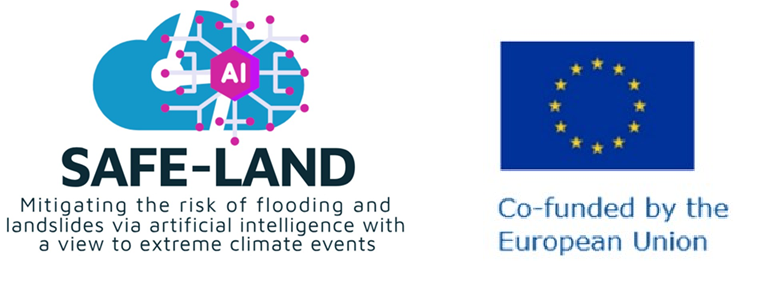 Project reference number: 101140345
Abstract:
This project proposes a tool that combines analytical/numerical methods with Trustworthy Artificial Intelligence to assess hydrogeological risk and generate guidelines on risk management planning and increasing risk awareness, even if hydrogeologic/demographic data is incomplete. The tool uses a knowledge base consisting of representative sets of reference areas and reference climate events. Trustworthy artificial intelligence makes the tool unique as it explains how it comes to results, making its reasoning understandable and reliable. Experts can work alongside the tool to select the best mitigation plans and insert new reference areas/reference climate events into the knowledge base, thereby obtaining a lifelong learning tool. The project involves Italy, Croatia, and Montenegro, which will collaborate and provide data regarding the areas where the pilot studies will occur.
The project started in February 2024 and has a duration of 2 years.
Participants:
Project reference number: 101140345
Abstract:
This project proposes a tool that combines analytical/numerical methods with Trustworthy Artificial Intelligence to assess hydrogeological risk and generate guidelines on risk management planning and increasing risk awareness, even if hydrogeologic/demographic data is incomplete. The tool uses a knowledge base consisting of representative sets of reference areas and reference climate events. Trustworthy artificial intelligence makes the tool unique as it explains how it comes to results, making its reasoning understandable and reliable. Experts can work alongside the tool to select the best mitigation plans and insert new reference areas/reference climate events into the knowledge base, thereby obtaining a lifelong learning tool. The project involves Italy, Croatia, and Montenegro, which will collaborate and provide data regarding the areas where the pilot studies will occur.
The project started in February 2024 and has a duration of 2 years.
Participants:
| N° Partner | Nome Partner | Stato |
| 1 | University eCampus | Italy |
| 2 | University of Pisa | Italy |
| 3 | MEDJIMURJE COUNTY | Croatia |
| 4 | MINISTARSTVO UNUTRASNJIH POSLOVA | Montenegro |
Erasmus+ Key Action 2: Capacity Building in Higher Education
Title of the project: Fostering Renewable energy technologies and energy Efficiency knowledge towards near Zero Energy Buildings of engineers and professionals in Western Balkan Countries (reZEB)
Project reference number: GA 101128611
Abstract: The project aims at enhancing the knowledge and skills of students of VET and engineering faculties in the field of renewable energy technologies and energy efficiency for near Zero Energy Buildings in some Western Balkan Countries. This goal is pursued through three main pillars: (i) the modernization of the modules selected within the project implementing also distance teaching methods and new laboratory equipment; (ii) the promotion of internships of students; (iii) the organisation of seminars and short courses for students and people from industry for their lifelong learning and re-skilling. The project started at the end of 2023 and will have a duration of 3 years. Participants:| N° Partner | Partner Name | Country |
| 1 | University of Castilla-La Mancha | Spain |
| 2 | University eCampus | Italy |
| 3 | Neapolis University | Cyprus |
| 4 | Gasilska Zveza Slovenije | Slovenia |
| 3 | Neapolis University | Cipro |
| 4 | European Education Initiative | Albania |
| 5 | Polis University | Albania |
| 6 | Professional College of Tirana | Albania |
| 7 | Universum College | Kosovo |
| 8 | International Business College Mitrovica | Albania |
| 9 | Co-Plan Institute (associated partner) | Albania |
| 10 | Albenecon (associated partner) | Albania |
| 11 | Municipality of Tirana (associated partner) | Albania |
| 12 | Kosovo Export Association (associated partner) | Kosovo |
| 13 | Alliance of Kosovar Business (associated partner) | Kosovo |
———————————————————————————-
PRIN2022 – MURTitle of the project:
WEPOP – WEarable Platform for OptImised Personal comfort

Project reference number: 2022RKLB3J
Abstract: New approaches for indoor environmental comfort measurement, modelling and control have been recently conceptualised to overcome the well-known limitations of the current methods. Personal comfort is definitely the most promising one, aiming at catching the problem of subjectivity. The fusion of physiological, environmental and personal data can feed the creation of new prediction models significantly improving the capacity of monitoring the real comfort perceived by the occupants to trigger an optimised response of HVAC and lighting systems. The recent progress in terms of wearable devices, IoT sensors and artificial intelligence (AI) fostered a growing number of research activities to demonstrate the feasibility of personal comfort models (PCMs) starting from the combination of physiological and environmental sensors and AI technologies. However, most of the research has been performed on a limited sample population, considering a single domain at a time (thermal or visual) and under strictly controlled conditions, not reflecting real-life context. The demonstration of such lack is that no application in real-life has been released yet, whereas the difficulties of transferring theoretical models into practice are widely discussed in the literature of multidomain approaches to environmental comfort. There is a strong need to provide proof of evidence that PCMs can improve both human indoor comfort and energy efficiency in buildings. To these aims, there are still some technical barriers to overcome: i) wearable sensors uncertainty, which is high because of artefacts and other disturbs; ii) the cross-related effects of environmental and psychological stimuli, which are partially unknown, leading to badly conditioned controls; iii) predictive models based on quite limited numbers of subjects so that the intra- and inter-subject diversities are marginally investigated. WEPOP will develop a new edge computing platform for real-time personal comfort measurement and control, by exploiting the experience created in the NEXT.COM project in the field of multidomain comfort measurement and modelling. The platform will include both physiological and environmental sensors, combined with an edge computing unit for the realisation and fine-tuning of PCMs, exploitable for control purposes, thus optimising both the occupants’ comfort level and the building energy efficiency. This will lead to the enhancement of subjects’ comfort (dissatisfied reduction >5%) and to the optimisation of energy consumption (-10%, at least). The project is organised into 6 Work Packages, conducted by 4 Research Units with cross-disciplinary expertise, for the development of physiological and environmental sensors and measurement procedures, data analysis and modelling algorithms, advanced operation and control of building technical systems integrated with BIM and energy models for environmental sustainability and human well-being in the built environment. Participants:| N° Partner | Partner Name | Country |
| 1 | University eCampus | Italy |
| 2 | University of Perugia | Italy |
| 3 | University of Palermo | Italy |
| 4 | Politechnic University of Marche | Italy |
For further details, please see the project website at: https://wepop-project.it/
————————————————————————————Past projects:
UCPM-2022-PP: Prevention anPreparedness Projects on Civil Protection and Marine Pollution. Title of the project: MULTIDIMENSIONAL SEISMIC RISK ASSESSMENT COMBINING STRUCTURAL DAMAGES AND PSYCHOLOGICAL CONSEQUENCES USING EXPLAINABLE ARTIFICIAL INTELLIGENCE (MEDEA).| N° Partner | Partner Name | Country |
| 1 | University eCampus | Italy |
| 2 | University of Pisa | Italy |
| 3 | MEDJIMURJE COUNTY | Croatia |
| 4 | Gasilska Zveza Slovenije | Slovenia |
Title of the project: Enhancement of engineering skills of students of all levels for application of evidence based sustainable renewable energy solutions in the built environment (Skybelt)
Project reference number: 610258-EPP-1-2019-1-IT-EPPKA2-CBHE-JP Abstract: The project aimed at enhancing the knowledge and skills of students (at all levels) in the field of renewable energy technologies to be integrated into the built environment at the partner countries universities. The project consisted of three main pillars: (i) the modernization of the modules selected within the project at Asian partner universities implementing also distance teaching methods and new laboratory equipment; (ii) the promotion of internships of students and their mobility; (iii) the involvement of external organizations working in the field of the project in order to create an extend network continuously cooperating also after the end. The project started at the end of 2019 and ended in November 2023. Participants:| N° Partner | Name of the Partner | Country |
| 1 | Università eCampus | Italy |
| 2 | University of Cukurova | Turkey |
| 3 | University of Northumbria at Newcastle | United Kingdom |
| 4 | Beijing University of Technology | China |
| 5 | Lanzhou Jiatong University | China |
| 6 | Universiti Putra Malaysia | Malaysia |
| 7 | Universiti Sains Malaysia | Malaysia |
| 8 | Naresuan University | Thailand |
| 9 | Chiang Mai University | Thailand |
 |
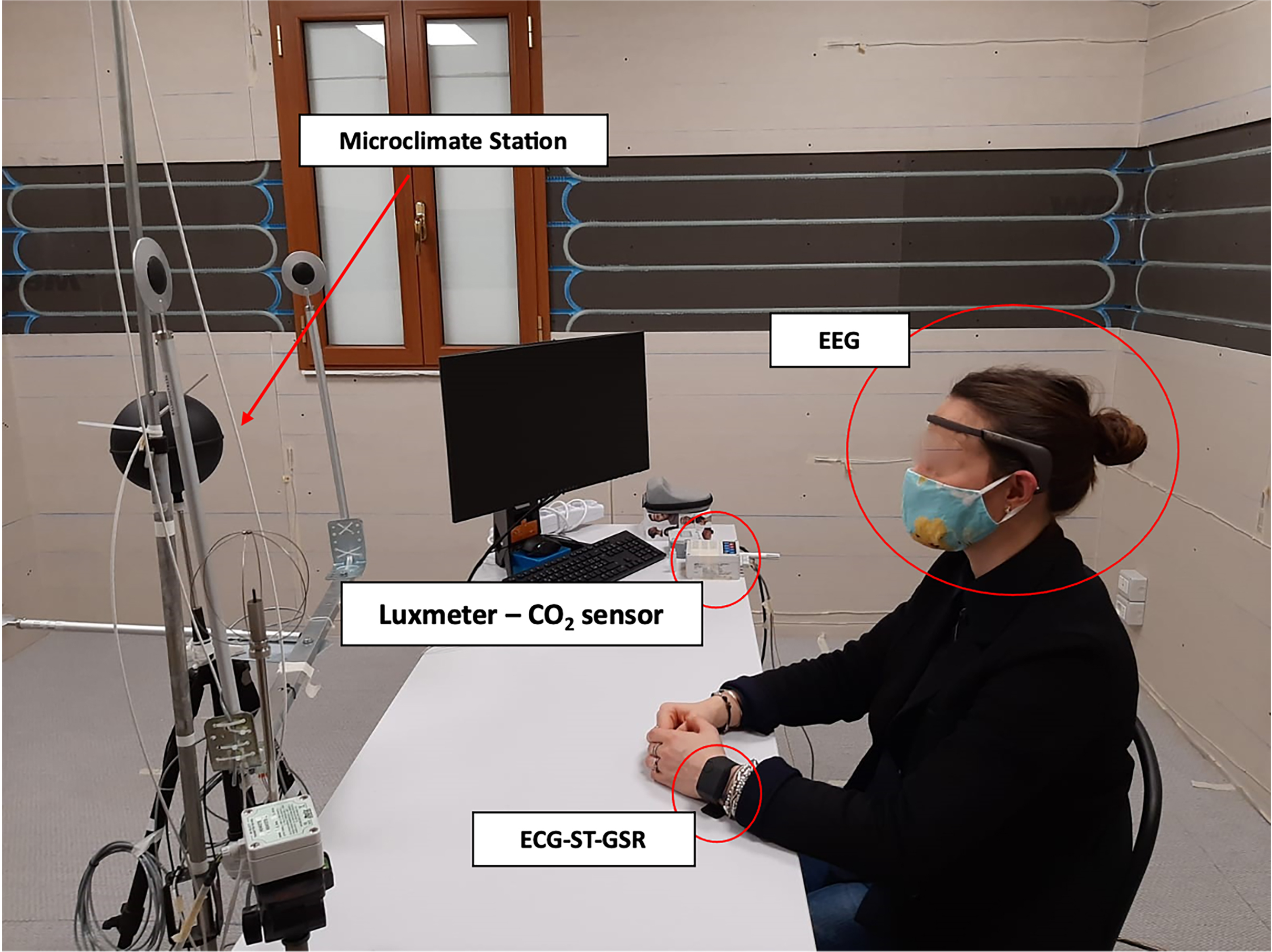 |
| N° Partner | Name of the Partner | Country |
| 1 | Politecnico di Torino | Italy |
| 2 | Università di Perugia | Italy |
| 3 | Università eCampus | Italy |
| 4 | Università Federico II | Italy |
Title of the project: Innovative Micro Solar Heat and Power System for Domestic and Small Business Residential Buildings (Innova MicroSolar)
Project reference number: 723596
Abstract: The overall objective of this project was to develop an innovative high performance and cost effective 2kWel/18kWth solar heat and power system for application in individual dwellings and small business residential buildings for on-site electricity and heat generation using solar thermal energy at temperature levels of 250-280 °C. The proposed technology consists of a small Organic Rankine Cycle plant, a linear Fresnel reflectors solar field and a thermal energy storage system based on phase change material and equipped with reversible heat pipes to guarantee the thermal and electrical energy production even in case of no sun for a time interval of about 3- 4 hours. Finally, an intelligent control system allows the management of the integrated system and its interaction with the user. The proposed plant had the objective of guaranteeing about 60% of the energy required by a domestic user with the ultimate goal of contributing to the decarbonisation of the residential sector. The plant has been installed and tested in the town of Almatret (Spain).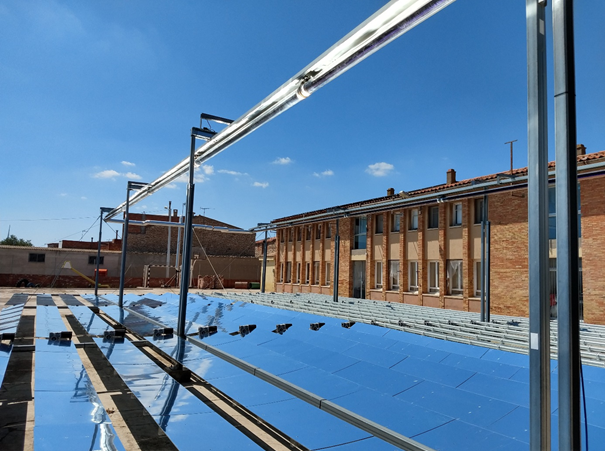 |
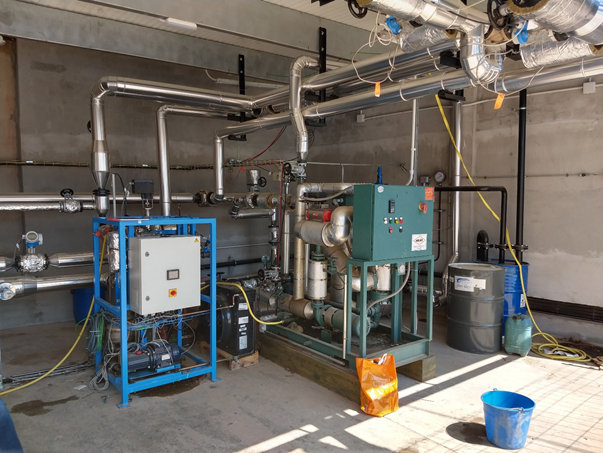 |
| N° Partner | Name of the Partner | Country/strong> |
| 1 | University of Northumbria at Newcastle | United Kingdom |
| 2 | University of Lleida | Spain |
| 3 | Università eCampus | Italy |
| 4 | Enogia | France |
| 5 | Thermacore Europe Ltd | United Kingdom |
| 6 | Elianto | Italy |
| 7 | STRATEGIE | Italy |
| 8 | Sinagro Enginyeria S.L.P. | Spain |
| 9 | User Feeback Program SI | Spain |
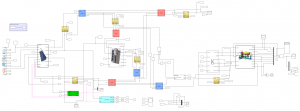 For further details please visit the project website: https://innova-microsolar-project.eu/
For further details please visit the project website: https://innova-microsolar-project.eu/
———————————————————————————-
Industrial Research for SOGEPU SpA
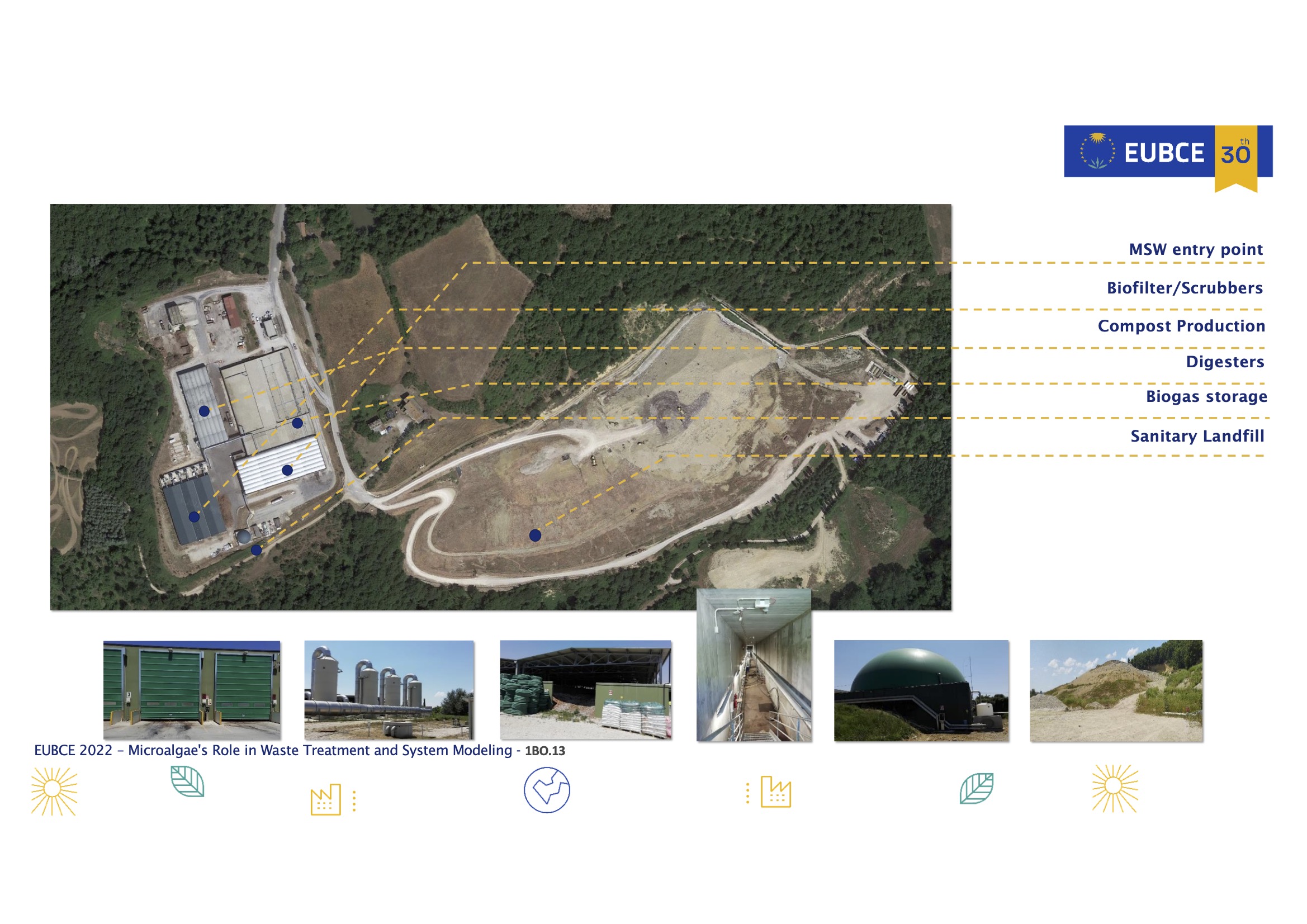 Abstract:
The Company had an interest in undertaking research and development activities at the Belladanza plant complex in order to optimize the management of the plant itself, reducing its environmental impact using microalgae and renewable energy generation systems. The following is the list of the conducted analyses:
Abstract:
The Company had an interest in undertaking research and development activities at the Belladanza plant complex in order to optimize the management of the plant itself, reducing its environmental impact using microalgae and renewable energy generation systems. The following is the list of the conducted analyses:
- energy diagnosis of Belladanza waste treatment plant
- evaluation of heat recovery from combustion flue gases
- evalution of phytodepuration, with microalgae, of wastewaters produced by the plant
- Life Cycle Assessment (LCA) of the waste management process.
- analysis of the potential of plastics residues gasification
- Comprehensive Life Cycle Assessment Analysis of an Italian Composting Facility concerning Environmental Footprint Minimization and Renewable Energy Integration
- Evaluation of Municipal Landfill Leachate Treatment by Microalgae
- A general model for air gasification of heterogenous municipal solid waste
- Comparative study of steam, organic Rankine cycle and supercritical CO2 power plants integrated with residual municiapal solid waste gasification for district heating and cooling
- Preliminary sizing of the PBR LED system and relative high added value molecule collection and extraction system
- Selection of algal species suitable for the development of algal biostimulants
- Study of the tolerance to the CO2 concentration of the selected species
- Support in the process of supplying a microalgal plant
- Study and definition of the most suitable scenario of collection and reuse of the textile polymeric fibers deriving from the PPE used during Covid-19 pandemics;
- Study and definition of the technical-economic feasibility of the application of waste PPE as a reinforcement for hot-mix asphalt;
- Experimentation and validation of the prototype in pre-industrial case studies.
 Participants:
Participants:
| N° Partner | Nome Partner | Stato |
| 1 | University della Tuscia | Italy |
| 2 | University of Bergamo | Italy |
| 3 | University eCampus | Italy |
- HMA for binder layer with SBS-modified bitumen and 50% of RAP;
- HMA for base layer with SBS-modified bitumen and 50% of RAP;
- Cold recycled asphalt base including 96% of RAP stabilized on site with polymer-modified bitumen emulsion and cement.
 Participants:
Participants:
| N° Partner | Nome Partner | Stato |
| 1 | University eCampus | Italy |
| 2 | Aeroporti di Roma S.p.A. | Italy |
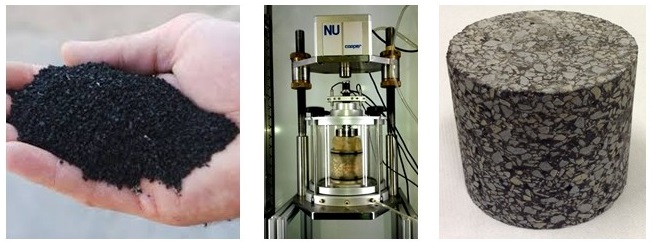
| N° Partner | Name of the Partner | Country |
| 1 | Università eCampus | Italy |
| 2 | Ecopneus S.c.p.A. | Italy |
———————————————————————————-
Project title: Study of the possibility to use the filler produced from Ladle Furnace Slags (LFS) in hot bituminous mixtures
Abstract: The present research aimed at evaluating the possibility of use ladle furnace “white” slags (LFS), deriving from the steelmaking industry by Gruppo Pittini, as filler in hot asphalt concrete. The objectives of the study were: – the assessment of the physical properties of the LFS, in order to verify the opportunity of its reuse in asphalt mixtures; – the definition of an adequate procedure for LFS treatment aimed at achieving physico-mechanical characteristics of the asphalt concrete comparable to those of the mixtures including industrial fillers with hydrated lime; – the laboratory validation, in terms of volumetric and mechanical properties, of the asphalt concrete including LFS filler, compared to a traditional mix including limestone filler. The project developed between March and September 2017.
| N° Partner | Name of the Partner | Country |
| 1 | Università eCampus | Italy |
| 2 | Ferriere Nord S.p.A. | Italy |
| 3 | Università Politecnica delle Marche | Italy |
